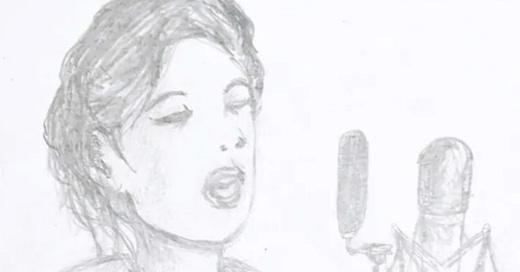Memoirs of a Shattered Soul — 02: My Mother's Voice
Closing my eyes today and listening to my mother’s voice singing her most famous song on the CD, I tried to imagine how she must have felt at her final concert.
February 20, 2013
This morning I wanted to hear my mother’s voice. So I did something I hadn’t done even once in all the time that we were living through the repercussions of the scandal in Japan: I listened to one of her CDs. Somehow, now that a little time has passed and I’m here in Switzerland, far away from Tokyo, it was possible to listen to the songs without crying.
I must admit, though, that some of the songs are kind of sad, in a wistful, dreamy sort of way. Japanese people love songs and poems about evanescence. Mono no aware… the sadness of the transience of life. Cherry blossoms falling from a tree branch. Or life ebbing away from a mortally wounded samurai, cut down in his prime.
Or snowflakes. Yuki no kessho. That’s another popular one. Murasaki Shikibu, who wrote The Tale of Genji (the oldest novel in history) liked to use snow as a metaphor for something perfect and beautiful that cannot last. “What could be more lovely than a winter night such as this, when the moon shines out of a cloudless sky upon the glittering, fresh-fallen snow?”
My mother’s most popular song is called “Yuki No Kessho.” And coincidentally, that is how I got my name, “Yukiko.” It means “snow child.”
There’s a place in Japan called Sapporo, on the island of Hokkaido, where there is a famous snow festival. Some of the snow sculptures you can see there are really impressive. I remember seeing one showing the characters from Star Wars, beautifully sculpted and larger than life. I also remember seeing one of Totoro, my favourite character from a Studio Ghibli film.
Then there are the ones based on my father’s video games. Those are, of course, extra special to us.
The last time my mother sang “Yuki No Kessho” in public was at the opening ceremony of the Sapporo Snow Festival in 1997. I’m told that two million people from all around the world attended the festival that year. The event had grown to truly international proportions. Coincidentally, it was also the first year that there were giant snow sculptures of the characters from my father’s video games there: Hoshi and Jo (Starr and Staff), as well as Lady Kaida and the Tiger and the Doubleheaded Dragon. Of course, I had not yet been born when that festival took place, but I’ve seen photos of those first snow sculptures towering above my parents.
Closing my eyes today and listening to my mother’s voice singing her most famous song on the CD, I tried to imagine how she must have felt at her final concert in Sapporo. She was five months pregnant. She always told me that when she sang, she could feel me inside her, moving to the music. And she was happy.
There are different kinds of love. My mother loved her career as a singer. She had also been a model and an actress before, but music was always her passion. From the moment she married my father, though, she said that loving and supporting him became her highest priority. Afterward, when they discovered she was pregnant, she said their love grew to include me. So giving up her career was not a difficult choice.
Her voice is the first memory I have. To me, it’s not the voice of Tomie Okura, famous idol pop singer. It’s just the voice that sang me lullabies in my crib, that encouraged me to explore and connect with the world… and that soothed me whenever I felt sad or hurt or afraid.
I thought that when I left Japan, I would miss my mother terribly— and that I would feel wracked with guilt about leaving her behind. It’s not her fault that she’s in a coma in the hospital, incapable of travelling. It’s not her fault that she cannot even call me on the phone to check how I’m doing.
As it turns out, though, the emotions I’ve felt since I arrived in Lauterbrunnen have been quite different from what I expected. My father was right: this is a good place to find peace. Most of all, I’ve discovered that my connection to my mother has not been lost.
Although her physical body is still in the hospital in Tokyo, her spirit is not bound by that. A part of her will always live inside of me. The truth is, I don’t need to listen to a CD to hear her voice. It’s something I can never lose. I can’t explain it, exactly, but I can hear her and feel her wherever I go.
After listening to the music, I just sat in silence for a while, looking out the window at the Swiss Alps. I sat like that for a long time, actually, not thinking about anything in particular, only random memories of my mother and of my whole life.
Eventually, I went to my violin case and opened it. I started playing, beginning with “Yuki No Kessho,” and then moving to classical pieces my mother loved to hear: Chopin’s “Nocturne” in C-sharp minor and Massenet’s “Meditation,” from the opera Thaïs.
I could feel my mother there beside me, smiling, her hand on my shoulder. I could hear her voice in my head, saying, “Arigato, Yukiko-chan.” Thank you....
You’re reading: Memoirs of a Shattered Soul




